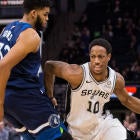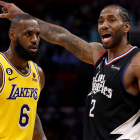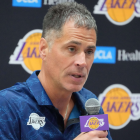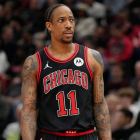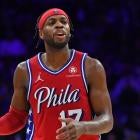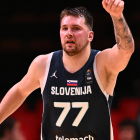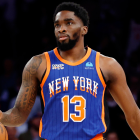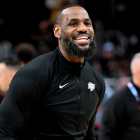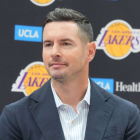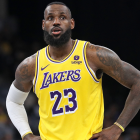MINNEAPOLIS -- The two biggest trades of the past year in the NBA involved two franchises that were forced into dealing their best player -- a player also happened to be fed up with that franchise.
All through the 2017-18 season, tensions simmered between the San Antonio Spurs and Kawhi Leonard. It was public and weird and at times kind of ugly, until Leonard was finally traded in July to the Toronto Raptors. At the same time, the tensions between the Minnesota Timberwolves and Jimmy Butler were building, but those tensions were kept mostly private. Until just before training camp, when Butler's trade demand became public knowledge, and it blew up in a major way. The ugliness even outweighed the Spurs-Kawhi fiasco, and overshadowed everything about the Wolves' season until, a little more than two weeks ago, Tom Thibodeau and the Wolves finally pulled the trigger and shipped Butler off.
But if these two situations mirrored each other with a disgruntled star demanding to be traded, the returns that each team received couldn't have been more different in substance and style.
In exchange for Leonard (as well as the attachment of Danny Green), the Spurs got DeMar DeRozan (as well as the attachment of Jakob Poeltl). It was the Spurs trading defense for offense. Kawhi at his best is the top two-way player in the league; DeRozan at his best is an excellent scorer who, um, also plays basketball on the defensive end of the court.
In exchange for Butler, Minnesota got Robert Covington and Dario Saric, plus some filler. The Wolves got two long, versatile shooters, but most importantly, they got an elite, versatile defender in Covington -- someone who, at his best, can measure up to Butler's defense. The Wolves gave up an elite two-way player, but in return they got elite defense and some added shooting and depth.
The shift in the two teams' fortunes since their respective trades has been stark.
After getting absolutely mauled by the Timberwolves on Wednesday night -- a 39-point blowout where the Spurs scored only nine points in the second quarter -- the Spurs are the 24th-ranked team in the NBA in defensive efficiency. Gregg Popovich is one of the finest defensive coaches to have ever set foot on an NBA court. This would be, by far, the worst defensive team he has coached since the 1996-97 season (that was the year where David Robinson was injured, and the Spurs were bad enough to get the No. 1 pick in the draft, which would become Tim Duncan).
On offense, the trade has made the Spurs an even more anomalous team for the modern NBA. What might be Popovich's greatest strength as a coach is his adaptability. So the Spurs this season have played to their newest strength, which is mid-range shooting; they have two of the best mid-range guys in the NBA in DeRozan and LaMarcus Aldridge. In a league that's trending toward the 3-pointer, the Spurs are averaging a league-leading 26.6 mid-range shots per game; that's three attempts more than the second-leading team. No team in the NBA takes more 2-point shots than the Spurs; only one team takes fewer 3s.
Before the Spurs lost to the Wolves, I asked Popovich about the structural changes he made in training camp. He deadpanned about why they took so many mid-range shots -- "If you were their coach, you'd probably want (Aldridge and DeRozan) to shoot more shots than the other people" -- but he also gave some insight into this season being a more difficult road from the beginning than past Spurs' seasons.
"I don't know if it's so much changes as just deciding where to begin with basically a new basketball team and a lot of guys who had never played together," Popovich said. "It was more about not skipping steps and kind of going back to the beginning where in the past there was so much corporate knowledge, you'd start the season running, everybody knowing their roles and their jobs. With this group, we had to begin with a lot more fundamental work, and the basics of what the system is, and then give them time to work together and learn about each other. It was much more of that than saying, 'Hey, we're going to change this on offense, or we're going to add this to our defense, or we're going to full-court press, or something like that.' "
This explanation didn't quite get at how bad this San Antonio defense has become. It's been 20 straight seasons where the Spurs have allowed an average of less than 100 points per game. Twenty-one games into this season, opponents are averaging 110.9 points per game against the Spurs. A better explanation would be a math equation that looks like this: Spurs + Demar DeRozan - Kawhi Leonard - Dejounte Murray = Bad Defense (Murray, an elite perimeter defender, was lost to an ACL injury before the season started; it's too bad we don't get to see what this roster would look like defensively with him on the court).
I asked Thibodeau about the Spurs' adaptations this season. He seemed to believe this San Antonio team would be just fine.
"When you look at Pop over the years, some teams have been better defensively, some were better offensively," Thibodeau said. "That's what makes him great. Whatever the strengths of the team are, that's what he's going to play to. They will cover up their weaknesses as best they can."
For the Wolves, things weren't working for the first month as the Butler trade demand cast a shadow on every move. They couldn't cover up their weaknesses. The team was 29th in the NBA in defensive efficiency; Butler, who was supposed to be the Wolves' defensive savior when he was acquired in 2017, ended up being their worst defender statistically this season. He posted the worst defensive rating on the team before he was traded a couple weeks ago.
But since the trade, something has changed. The Wolves have reinvented themselves on the fly. One of the worst defensive teams in the NBA over the first 13 games -- the Wolves ranked 29th in defensive efficiency when Butler was traded -- has become one of the best. The Wolves have ranked second in the NBA in defensive efficiency in the nine games since Butler was traded. And they're 7-2 ("You can't win without me." LOL).
On Wednesday night, the Wolves absolutely throttled the Spurs defensively. During the second quarter -- the quarter in which the Spurs scored only nine points -- there was one possession in which the Spurs kept trying to get penetration, to get the ball in the paint, to get anything. With a few seconds left on the shot clock, Davis Bertans threw up an ugly three from several feet beyond the 3-point line. That was the best shot the Spurs could get. That type of possession repeated itself all night against the Wolves' active defense. Covington only had one steal on the night, but his consistently active defense seemed contagious, and the Timberwolves swiped the ball 12 times. Covington's plus-minus was an absurd plus-44 ("I don't know if I've ever seen that before," Thibodeau said).
If there's one difference between the Wolves with Butler -- at least, with Butler except for when he was out with "general soreness" -- and the Wolves without Butler, it's that. The Wolves are active and engaged on defense in a way they rarely were when he was on the team. Covington has quickly emerged as an alpha-dog-like leader on this team, and the rest of the Wolves have been thrilled to follow.
"What we're seeing is Robert, he's so disruptive, he gets so many deflections, and it gets everyone going -- everyone gets active," Thibodeau said. "From just coaching against him you always felt his energy in the game. What you don't see is how disruptive he is. I knew when we played against him, if you weren't tight with the ball, he'd strip it. If you tried to throw over him, he's a very hard guy to throw over. He's very versatile in terms of switching. He reads and he anticipates extremely well. He has great knowledge of the league and what guys are trying to do. He's unbelievable. He's not just a great individual defender -- he's a great team defender as well."
"He's definitely first team all-league defense," Thibodeau added. "He's special."
No one would make the argument that Robert Covington is a better player than Jimmy Butler. But in trading Butler's elite defense and getting in return another elite defender in Covington, the Timberwolves doubled down on what Thibodeau is best known for. And in flipping Kawhi for an offense-first player in DeRozan, the Spurs reinvented themselves into a team with personnel that's utterly unlike any team Popovich has coached.
Making any big statements off of one 48-minute basketball game is, of course, silly. But Wednesday night's blowout was certainly indicative of two larger trends with these two teams: The Spurs moving away from elite defense, and the Wolves moving toward it.
The two biggest trades of the past year in the NBA both involved teams that didn't want to trade away their star. But once they did, the respective trades appear to have sent those two teams in very different directions.









